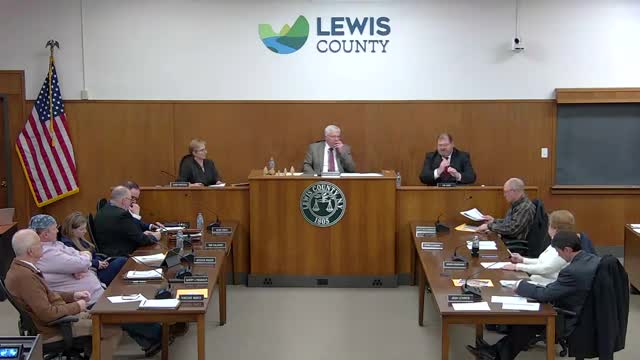County manager outlines $2 billion HydroStore energy-storage proposal; officials weigh impacts
Get AI-powered insights, summaries, and transcripts
Subscribe
Summary
County Manager Tim Hunt told the Lewis County Legislature that HydroStore is pursuing parcels in the towns of Krogan and Watson for a proposed $2 billion compressed-air energy-storage facility that the company says would take about five years to build, create roughly 700 construction jobs and 40 permanent jobs, and operate for decades.
County Manager Tim Hunt told the Lewis County Legislature that a company called HydroStore is pursuing options on two parcels in Lewis County — one in the town of Krogan and one in the town of Watson — to build an underground compressed-air energy-storage facility.
Hunt said the company described the proposal as a roughly $2 billion investment that would take about five years to build, create an estimated 700 construction jobs and about 40 full-time permanent positions, and operate as a long-term asset (the company described an expected life of roughly 70 to 75 years).
Hunt summarized the technology and local impacts: electricity would power compressors that force air into a deep underground cavern, displacing water into an aboveground holding pond; when electricity is needed, water would be released to compress the air back through turbines to generate power. Hunt said the company described drilling an approximately 8-foot diameter shaft down roughly 2,000 feet and blasting rock to create an underground cavity the size of a football-field cubed.
On technical and environmental points, Hunt said the company told the county that the operation generates noise from compressors but estimated fence-line sound levels of about 50 decibels (comparable to normal conversation). He said the shaft would penetrate the water table and require lining; the county would consult engineers and regulators to evaluate groundwater and geotechnical impacts. Hunt also said the technology is relatively new: there is one operating site in Canada and one facility in California that is not yet producing power.
Hunt said the company anticipates the facility would store electricity for about eight hours per cycle and could complete two to three cycles per day depending on grid demand; the firm estimated round-trip efficiency in the neighborhood of 66 percent. He said the company indicated the project could reduce the need for battery farms over the long term.
Legislator North asked whether the technology is proven; Hunt replied that it is "very new" and that the county is attempting to arrange a site visit to a Canadian facility.
Why it matters: a project of this scale could involve extensive environmental review, long-term land-use implications, and community concerns about noise, groundwater impacts and mine-waste disposal. County officials said they are gathering information and expect the company to narrow site choices within roughly eight weeks.
Next steps: county staff said they are organizing further fact-finding, including an intended site visit to an operating facility, and will brief the Legislature as more details become available.
